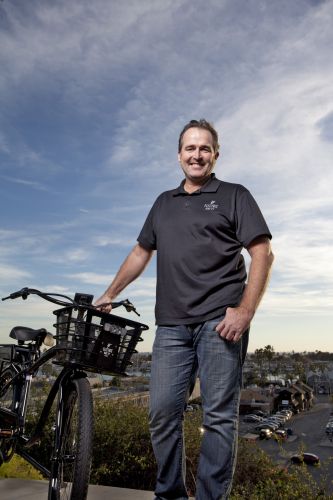COSTA MESA, Calif. (BRAIN) — Electric Bicycle Co., which assembled and painted custom e-bikes at its California facility, filed for Chapter 7 bankruptcy liquidation last week, listing total liabilities of $6.1 million, including secured claims of $960,000, and assets of $953,000.
South African-born Sean Lupton-Smith, following a career as a restaurateur, founded EBC about 14 years ago.
He told BRAIN on Wednesday that U.S. tariffs on imported components contributed to the failure.
“(I) thought Trump would save the day but in fact our tariffs on our parts went up from 25% to 55% and more,” he said in an email. “KILLED us as well as financing charges and other factors — but competitors are skirting tariffs through other countries — under invoicing and selling direct and often below costs without legitimate certifications, safety standards, etc.”
Lupton-Smith said he was devastated by the business failure and is redirecting his energies toward ebikesafety.com, which provides safety tips for e-bike riders.
“I’m pivoting now to focus on e-bike safety — with all my knowledge of building here in USA — I’m going to now use that to make e-bikes safer, especially for kids, and get laws and legal requirements to be enforced,” he said.
“Without proper tariff protection and legit safety standard enforcement, no one will ever be able to make an e-bike in the USA in my opinion.”
‘Not for sissies.’
In a 2020 article in BRAIN, Lupton-Smith said he knew EBC couldn’t compete on price with Asian-made e-bikes, so he set out to create customizable bikes with as much U.S.-made content as possible to minimize tariff exposure. At EBC’s California factory, workers painted frames, fenders, and chainguards to order, built wheels, assembled battery packs, and assembled and packaged complete bikes to order.
In 2020, he said about 22% of the value of EBC bikes came from China, with the rest from Taiwan, Japan, the Netherlands and the U.S. A wooden chainguard option was made by a furniture maker in Oregon, for example.
“The bike industry is not for sissies, I’ve learned that,” he told BRAIN for the 2020 article. At the time he said EBC had about 40 employees at its Newport Beach factory.
Lupton-Smith had lobbied for tariff relief on bicycle and e-bike components, which were especially painful during the period when complete e-bikes were imported duty-free from China (a status that ended in May 2024 when Section 301 tariff exclusions on Chinese e-bikes were allowed to expire).
The company launched a crowdfunding campaign earlier this year, with a goal of raising between $20,000 to $1.23 million. The campaign closed Sept. 12 after raising $171,000. A crowdfunding prospectus said EBC had sales of $9.5 million in its most recent fiscal year, with a net loss of $1.975 million.
EBliss, a company founded by a group of U.S. industry veterans, announced plans to open e-bike assembly factory in Utica, New York this summer, with the intention of adding full bike manufacturing eventually. Blaupunkt also recently announced plans to assemble its folding e-bikes in North Carolina, while Guardian continues to ramp up manufacturing of its D2C juvenile bikes in Indiana.
On the other hand, Kent International closed its South Carolina bike assembly plant this summer, with Kent’s Chairman Arnold Kamler saying component tariffs made it impossible to assemble bikes for the U.S. mass market. that could compete with complete bike imports. And Fuell, an e-bike brand bolstered by several crowdfunding campaigns, also filed for Chapter 7 bankruptcy last October.


